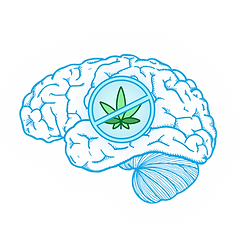



SCROLL DOWN FOR
TOPICS & ACTIVITIES

MODULE TWO
CANNABIS AND THE DEVELOPING BRAIN
Years 7 & 8 Band, Health & Physical Education
FOCUS AREA:
-
Alcohol & Other Drugs
-
Food & Nutrition
-
Mental Health & Wellbeing
LESSON PLAN:
Cannabis & the developing brain - 45 minutes
TOPICS:
1. Facts about Cannabis
2. How Cannabis use affects the developing brain
Close - Portfolio/homework allocated
SUGGESTED SESSION TIME ALLOCATIONS:
15 minutes
25 minutes
5 minutes
NOTE ON FLEXIBILITY:
Teachers may prefer to allocate 2 or more 45 minute sessions to this module, to allow students more time to respond online and re-watch videos. This would be particularly relevant, if additional, longer-term projects were determined as useful to consolidate and share knowledge and findings in the wider community.
CANNABIS & THE
DEVELOPING BRAIN
Introductory Notes:
*Cannabis and Marijuana are used interchangeably as the same drug.
It is important for teachers & facilitators to understand that social and emotional learning fosters the ability to make positive choices about how we behave. As teens, students need to build up the ‘tool kit’ of life skills to strengthen their decision-making skills.
These include:
-
self-awareness
-
self-concept
-
social awareness
-
social management
-
critical thinking
-
problem solving
-
reflecting & analysing
These can be incorporated through the segment via online group discussion. Additionally, when face to face group opportunities present themselves use may be made in pedagogy such as role-play, debating, presentations at assemblies, and local community groups. Teachers will also know that our experiences and actions affect the way our brains develop and positive role models and interactions from family members and others such as club leaders, coaches, teachers, friends and social groups.
Quality feedback, reactions and experiential learning add to the teen’s ‘tool kit’ by helping them to learn:
• Strategies for relating and interacting with others
• Assertive behaviour skill
• How to establish and manage changing relationships – offline and online
• General health and wellbeing activities
• What impact Social / emotional health has on general well being
• Observe real resilience skills in action that support resilient behaviour
• See how others demonstrate coping skills and help seeking strategies
Topic 1 - Facts about Cannabis
ONLINE CLASSROOM TASK
Read though notes and answer questions.
Cannabis, also known as marijuana refers to the dried leaves, flowers, stems and seeds from the Cannabis sativa or Cannabis indica plant. The plant contains the mind-altering chemical THC and other similar compounds. Marijuana is the most commonly used psychotropic drug after alcohol. People smoke marijuana in hand-rolled cigarettes (joints) or in pipes or water pipes (bongs) and vaporisers. Most concerning is that it can also be mixed in food (edibles), such as brownies, cookies or candy.
Effects of marijuana on brains and bodies

Cannabis is no longer considered a 'soft' drug. There is now overwhelming evidence of the harms of cannabis to the developing brain, both to the unborn child and to teens.
Topic 2 - How cannabis use affects the developing brain
ONLINE CLASSROOM TASK
Watch at least one of the videos below and look for 5 facts about how cannabis impacts on the developing teen brain. Students can add these to their e-portfolio for this module.
Is marijuana bad for your brain?

Marijuana's effect on teen brains
AND/OR
Effects of cannabis on the teenage brain
PORTFOLIO / HOME STUDY
Students review the videos in this module and record their findings in their E-Portfolio - 'We are programmers of our own brains'. Their findings should include at least two main learnings about the short term impact of cannabis on the brain and at least two main facts about the long term effects of cannabis use on the brain.
Students can research stories about young people who have experienced the effects of marijuana use, using these cases:
Students may like to play this game:
And then develop their own game electronically, with facts based on their own research.
Students may also continue to suggest ways to use health practices, behaviours and resources to enhance health, safety and wellbeing of their communities. For example, add to a poster display in a nominated public place such as a shopping centre or at school assemblies. The poster could be hard copy or electronic in presentation. This could be done in groups and connect to other classes ie. Art, IT etc.

OR

Is this what we want for Australia?
Legal Cannabis?
SAY NO!



Links to the Australian Curriculum
KEY LEARNING AREAS:
Health and Physical Education
-
ACPPS073 - Investigate & select strategies to promote health, safety & wellbeing
-
ACPPS076 - Evaluate health information & communicate their own & others' health concerns
-
ACPPS077 - Plan & use health practices, behaviours & resources to enhance health, safety & well being of their communities

Want to get involved?
REACH OUT
If you are interested in participating at any level, or want more information, please contact Jo Baxter at Drug Free Australia